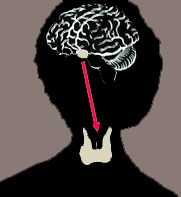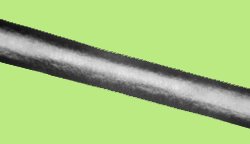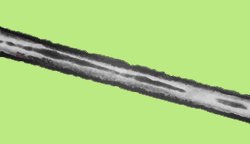- The thyroid gland secretes hormones whose role is to vital for the hair.
- Hypothyroidism, like hyperthyroidism, disrupts the natural renewal of hair and leads to abundant hair loss all over the head.
- The right dosage of medical treatments to correct the lack or excess of thyroid secretions is essential to rebalance the hair life cycle. At the same time, local treatment of the scalp is also essential to work in synergy with the medical treatment, stopping hair loss and restoring normal hair density. To find out more, ask for a in-depth diagnosis of your hair.
1° THYROID IN A NUTSHELL
Little known to the general public (except for those to whom it plays tricks), the thyroid gland is located at the base of the front of the neck and weighs only 20 to 30 grams. It is made up of two lobes, joined by an isthmus, which makes it look like a butterfly. Each lobe is normally no larger than the second phalanx of the thumb. The thyroid gland secretes two iodine-rich hormones: T3 and T4, whose secretion is itself controlled by TSH, a hormone from the pituitary gland, another endocrine gland located at the base of the brain.

In the event of thyroid insufficiency, the pituitary gland reacts to stimulate the thyroid and TSH levels rise. On the other hand, in the case of excessive production, TSH levels fall.
Normal thyroid hormone production is called euthyroidism, insufficient production hypothyroidism and excessive production hyperthyroidism. Thyroid disorders are more common in women than in men: approximately 1 man for every 5 women. Hypothyroidism mainly affects women over 50, while hyperthyroidism mainly affects women between 20 and 40. Screening is carried out by means of a blood test:
HYPOTHYROIDISM
- TSH too high
- T4 too low
- T3 too low
HYPERTHYROIDISM
- TSH too low
- T4 too high
- T3 too high
2° OVERALL ACTION AND IMPACT ON HEALTHY HAIR
The thyroid gland is responsible for keeping all the body's systems in action and regulating them; it is our body's central thermostat. More specifically :
OVERALL ACTION ON THE BODY
Activates and controls energy exchange in all cells. Stimulates tissue oxygen consumption and gives tissues normal trophicity, i.e. normal development and resistance.
IMPACT ON HEALTHY HAIR
Stimulates hair follicles, regulates hair cycles, balances sebaceous gland activity and sebum production. Promotes hair strength and tone.
3° SYMPTOMS OF THYROID PROBLEMS ON YOUR HAIR
The symptoms associated with thyroid disorders can vary from one individual to another and do not necessarily manifest themselves in the hair. That said, a significant number of patients notice changes in their hair. We have listed below the symptoms most frequently encountered by people who consult us.
FOR HYPOTHYROIDISM
LIFE CYCLE - Chronic, diffuse hair loss: the percentage of telogen hair increases and the telogen phase lengthens, leading to a delay in the anagen phase of the hair. life cycle of a hair. Hair is becoming rarer.
KERATIN - Keratin The hair becomes more brittle, less regular and less pigmented. The hair loses its tone, feels "tangled" and is harder to comb and detangle.
ASPECT - Hair is dull and rougher, often drier, and takes on a woolly appearance. It can bleach more easily.
FOR HYPERTHYROIDISM
LIFE CYCLE - Hair loss The hair can also be diffused by increasing the rate at which it is produced. Here, the three phases of hair cycle accelerate and hair grows and falls out faster than normal.
KERATATIN - Exhausted by too fast a pace, hair follicles produce weaker and weaker roots and hair. The result: keratin. hair becomes thinner and easily brittle.
ASPECT - The hair is often oilier, softer and finer. It can look too silky.
4° MEASURES TO BE TAKEN FOR THE HAIR
ADJUSTING THYROID SECRETIONS
As long as your medical treatment is not perfectly regulated (Levothyrox, Euthyral, L-Thyroxine... for hypothyroid patients, Neo-mercazole, Basdene, Propylex/Propylthiouracil, Thyrozol... for hyperthyroid patients), your hair follicles may suffer directly, as these are the body's most rapidly renewing cells. The condition of the hair can even be used as an indicator of whether the treatment is being properly dosed.
OVERDOSAGE - Beware, these treatments can cause hair loss, due to hyperthyroidism in the case of Levothyrox or hypothyroidism in the case of Neo-Mercazole. This is known as an iatrogenic effect (caused by the medical treatment itself).
OUR ADVICE - Never neglect your regular blood tests. They allow your doctor to check whether your doses are "set" or whether they need to be readjusted.
ANOTHER TIP - You need to be patient because hair doesn't react immediately: when it dies (telogen phase), it remains on your head for between 2 and 4 months before it actually falls out. In other words, if your thyroid levels have recently been balanced, your hair may still fall out for a few weeks, but there's nothing to worry about.
ADJUNCTIVE HAIR TREATMENT
Alongside your medical treatment, we can help you to promote hair regrowth and vitality to your hair.
But first we need to a local anti-hair loss treatmentA treatment based on natural essential oils, plant proteins and vitamins.
PLEASE NOTE - An effective hair treatment will also reduce the stress you may be feeling about your hair, which can only be good for it. In our experience, the stress caused by thinning hair is a common aggravating factor in people suffering from thyroid disorders: it can strongly contribute to this thinning.


HAIR SCREENING - In the event of unexplained diffuse hair loss and after examination of the keratin. We sometimes advise our patients to have a blood test to check their TSH, T3 and T4 levels. The results often confirm the hypothesis we had formulated, in view of a keratin visibly weakened by a thyroid problem.
Right: normal keratin - Left: marked "hypothyroid" keratin


Good morning, Sir,
I haven't had a thyroid since April 2015 following cancer. I took levothyrox until October 2017 then Eutyrox until now and since then my hair has become very thin...difficult to style...and it's especially on the top of my head that I don't have much hair left. It scares me...Thank you for answering me....
Hello, hair problems linked to thyroid imbalance are well known to the Centre Clauderer. To help you regain better quality hair, don't hesitate to make an appointment for a full diagnosis of your hair. If you are unable to come in person, our diagnosis request form is available online, in the "I want a diagnosis" section. Yours faithfully The Clauderer Team
Good evening I have been diagnosed with basedow disease and I have a large loss of hair. I have no more brake.
Hello, We'd be delighted to provide you with a personalised solution to your hair loss problem. Please do not hesitate to contact us. Best regards. The Clauderer Team
I suffer from hashimoto's hypothyroidism and I'm on thyroxine. I'm losing a lot of hair and I'd like to know what shampoo to use.
Hello, Madam,
Thank you for your message.
First of all, as explained in our article Hair loss and thyroid problems, it's essential to make sure that your treatment is perfectly suited to your case. Secondly, a shampoo, however gentle and natural, is not designed to slow down hair loss.
For its part, the Centre Clauderer can certainly help you and offer you a solution to remedy your hair loss: don't hesitate to contact us for an appointment (on 01 42 61 28 01 or contact@centre-clauderer.com) or an online diagnosis. Yours sincerely The Clauderer Team